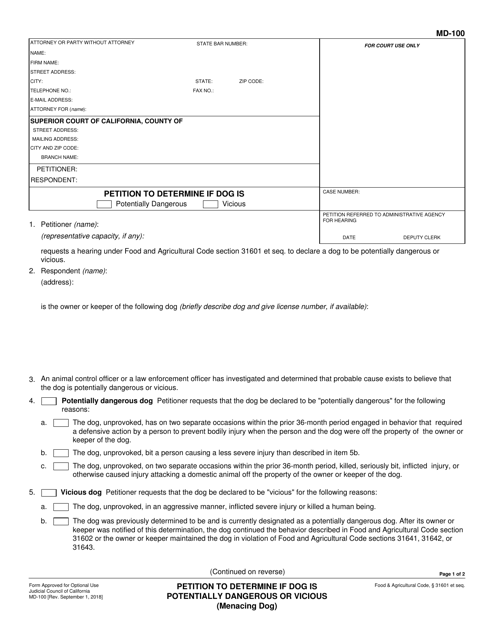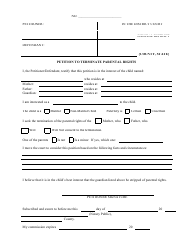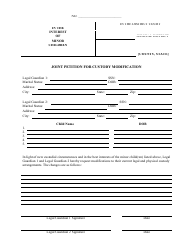Form MD-100 Petition to Determine if Dog Is Potentially Dangerous or Vicious - California
What Is Form MD-100?
This is a legal form that was released by the California Superior Court - a government authority operating within California. As of today, no separate filing guidelines for the form are provided by the issuing department.
FAQ
Q: What is Form MD-100?
A: Form MD-100 is the Petition to Determine if a Dog is Potentially Dangerous or Vicious in California.
Q: Why would someone need to file Form MD-100?
A: Someone would need to file Form MD-100 to request a determination on whether a dog is potentially dangerous or vicious according to California law.
Q: What does it mean for a dog to be potentially dangerous or vicious?
A: A dog is considered potentially dangerous if it has bitten someone without provocation, and vicious if it has caused serious injury or death to a person.
Q: Who can file Form MD-100?
A: Any person, including a law enforcement officer or animal control officer, may file Form MD-100.
Q: What information is required on Form MD-100?
A: Form MD-100 requires information about the dog, its owner, the incident(s) in question, and any witnesses or supporting evidence.
Q: What happens after filing Form MD-100?
A: After filing Form MD-100, a hearing will be scheduled where evidence can be presented to determine whether the dog is potentially dangerous or vicious.
Q: What are the possible outcomes of the hearing?
A: The possible outcomes of the hearing include determining that the dog is potentially dangerous or vicious, imposing restrictions or conditions on the dog owner, or ordering the dog to be euthanized.
Q: Can the dog owner appeal the decision?
A: Yes, the dog owner can appeal the decision within 30 days after the hearing.
Q: Are there any legal consequences for owning a potentially dangerous or vicious dog?
A: Yes, there are legal consequences for owning a potentially dangerous or vicious dog, including restrictions on the dog's activities and potential liability for any future incidents.
Form Details:
- Released on September 1, 2018;
- The latest edition provided by the California Superior Court;
- Easy to use and ready to print;
- Quick to customize;
- Compatible with most PDF-viewing applications;
- Fill out the form in our online filing application.
Download a fillable version of Form MD-100 by clicking the link below or browse more documents and templates provided by the California Superior Court.






